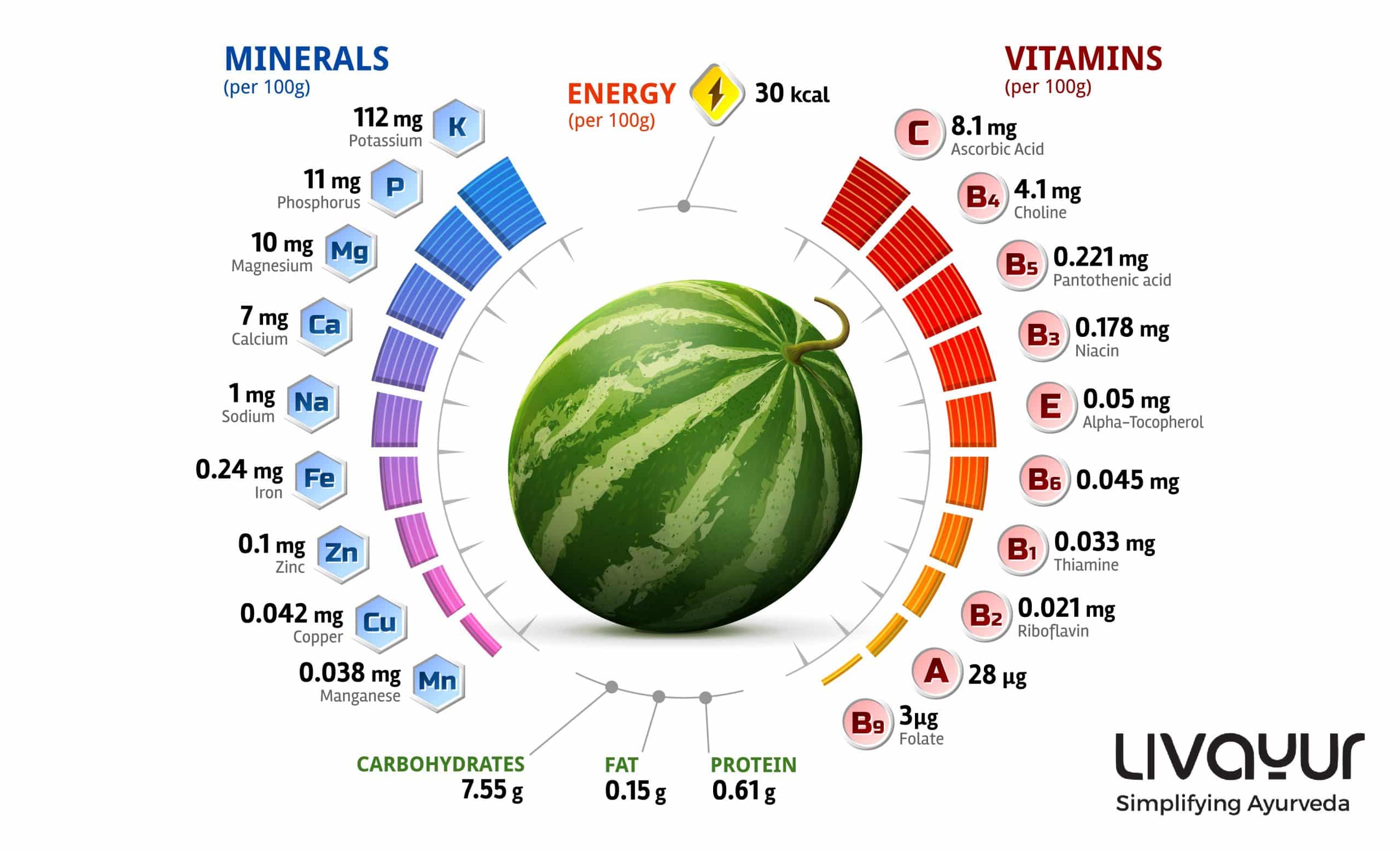
In Ayurvedic dietary principles, the significance of food choices extends far beyond mere sustenance. Ayurveda significantly emphasizes the connection between food, body, and mind. This article delves into a quintessential summer delight, the watermelon, from an Ayurvedic perspective, to explore its potential as a weight loss aid.
Beyond its refreshing taste and high water content, we aim to uncover the intricate balance of elemental forces, known as doshas, that watermelon embodies and how its consumption may align with Ayurvedic principles to promote optimal weight management.
Watermelon and its high water content benefits
Watermelon offers a remarkable contribution to one’s journey toward weight management, primarily attributed to its exceptionally high water content. Approximately 92% of the weight of a watermelon consists of water, rendering it a natural and effective means to maintain proper hydration levels.
In Ayurveda, maintaining hydration is fundamental for overall well-being, as it nurtures the delicate balance of bodily doshas, notably Vata, Pitta, and Kapha. Moreover, contemporary studies consistently endorse the hypothesis that adequate hydration is pivotal in weight loss. When one’s body sufficiently remains hydrated, it operates more efficiently, improving metabolic processes and enhancing calorie expenditure.
The merits of watermelon extend beyond hydration, as its copious water content also contributes to a lasting sense of fullness, thereby aiding in appetite control. When sugar cravings strike, indulging in watermelon can satiate the palate and reduce the inclination for less wholesome choices. This satiating effect is complimented by natural sugars in the fruit, offering a healthier alternative to processed sugary snacks.
Furthermore, watermelon contains a wealth of essential electrolytes, like potassium and magnesium, which swiftly replenish energy levels. These factors help foster vitality and act as a preventive measure against heat strokes, which can become prevalent during the sweltering summer months. As such, watermelon’s unique combination of high water content, satiety-inducing properties, and electrolyte benefits aligns with Ayurvedic principles and substantiates its potential as a supportive element in the pursuit of weight loss. [1] [2]

Nutritional value of watermelon
Here’s the nutritional value of 100 g of watermelon. [1]
| Name | Amount |
| Water | 91.4 g |
| Energy | 30 kcal |
| Energy | 127 kJ |
| Protein | 0.61 g |
| Fiber, total dietary | 0.4 g |
| Glucose | 1.58 g |
Watermelon and low-calorie benefits
In weight-conscious dietary choices, watermelon emerges as a favorable contender due to its remarkably low-calorie content. Approximately 100 grams of watermelon yields 30 calories, while a one-cup serving contains just 40 to 46 calories. This low-calorie profile is crucial for individuals seeking to manage their weight without compromising the pleasure of eating.
For those engaged in calorie-conscious regimens or meticulously tracking their daily energy consumption, watermelon can be an invaluable addition to a diet plan. The significance of this low-calorie attribute extends beyond the simple numerical count; it resides in the fact that watermelon’s palatability and natural sweetness offer a wholesome alternative to calorically dense treats.
In the quest for weight loss, individuals often grapple with the desire for sugary indulgences; this is where watermelon truly shines. It allows for the satisfaction of sweet cravings without the burden of excessive caloric intake. As such, watermelon is crucial in weight management efforts, offering a refreshing, guilt-free indulgence that does not contribute to weight gain. [1]
Watermelon benefits for obese individuals
For individuals grappling with obesity, the multifaceted benefits of watermelon extend beyond its low-calorie content and high-water composition. It can be valuable in weight management strategies, especially in circulatory and cardiovascular health.
Watermelon supports blood circulation and contributes to managing blood pressure, particularly in individuals contending with obesity or those who face the challenges of hypertension and prehypertension. It is because of watermelon’s rich concentration of specific bioactive compounds, including L-citrulline, a naturally occurring amino acid.
L-citrulline plays is crucial in the vasodilation of blood vessels, which results in a relaxation of the arterial walls and improved blood flow. This effect can prove highly beneficial for obese individuals, as excess weight can often lead to elevated blood pressure and increased strain on the cardiovascular system.
Facilitating enhanced blood circulation and regulating blood pressure helps watermelon offer a holistic approach to health that aligns with Ayurvedic principles. Ayurveda recognizes the connection between the body’s doshas and the circulatory system, underscoring the importance of balanced blood flow for overall well-being. The potential of watermelon to support circulatory health, especially in individuals grappling with obesity, highlights its significance in the broader landscape of weight management. [3]
Watermelon benefits in burning fat quickly
Watermelon harbors a remarkable secret that can be of immense significance to individuals seeking efficient fat loss in their weight management journey—the secret lies in its abundant content of a particular amino acid known as arginine. As a subject of scientific scrutiny, arginine has emerged as a potential catalyst for expediting the process of fat burning.
Arginine, found in generous quantities within watermelon, is a precursor to nitric oxide. It is a molecule that plays a pivotal role in vasodilation and the relaxation of blood vessels. This dilation of blood vessels enhances blood flow, which, in turn, contributes to improved nutrient delivery to muscles and efficient utilization of stored fat for energy. The scientific evidence supporting arginine’s role in facilitating the breakdown of fats suggests that it may aid in expediting the fat-loss process.
As fat stores are mobilized and utilized for energy more effectively, individuals may experience a heightened rate of fat loss, which aligns with their weight management goals. This attribute of watermelon provides a synergistic dimension to the fruit’s benefits, allowing it to stand as a potential ally for those on the path to weight loss. Its richness in arginine underscores the intricate relationship between the constituents of this fruit and the potential for facilitating the fat-burning process.
Ayurveda’s emphasis on the individual’s unique constitution, or prakriti, and the harmonious balance of doshas recognizes the value of such natural compounds in achieving and maintaining an ideal weight. With its arginine content, watermelon’s inclusion in a balanced diet offers a compelling dimension to the Ayurvedic approach to holistic health and weight management. [4]
FAQs
1. Is watermelon juice good for weight loss?
2. Is watermelon good for a weight loss diet?
3. Can I eat watermelon if I want to lose weight?
4. When should I eat watermelon to lose weight?
You can enjoy watermelon at various times throughout the day. It’s a refreshing and low-calorie snack, making it a suitable choice between meals or as part of a balanced meal to help control overall calorie intake.
Conclusion
With its exceptional high-water content, low-calorie profile, and arginine-rich composition, watermelon presents a multifaceted weight management approach. It serves as a refreshing, low-calorie alternative to sugary snacks. Its innate ability to keep you hydrated and satiated and support efficient fat-burning adds a layer of depth to its potential as a valuable dietary ally in pursuing a healthier weight.
Furthermore, watermelon’s role in enhancing blood circulation and helping manage blood pressure holds particular promise for individuals contending with obesity and related conditions. As we embrace the holistic principles of Ayurveda, it becomes clear that watermelon’s attributes harmonize with the pursuit of balance, vitality, and optimal well-being. Therefore, whether you strive to shed excess pounds, maintain a healthy weight, or embrace a more mindful approach to nutrition, watermelon’s place at the table is well-justified.
Disclaimer
The information provided here does not intend to replace professional advice or treatment.
References
- Watermelon, raw
- Increased Hydration Can Be Associated with Weight Loss
- Watermelon extract supplementation reduces ankle blood pressure and carotid augmentation index in obese adults with prehypertension or hypertension
- The Potential of L-Arginine in Prevention and Treatment of Disturbed Carbohydrate and Lipid Metabolism—A Review





















I’ve been absent for a while, but now I remember why I used to love this blog. Thanks , I¦ll try and check back more often. How frequently you update your site?
Thanks for helping out, good info. “Job dissatisfaction is the number one factor in whether you survive your first heart attack.” by Anthony Robbins.
Everything is very open and very clear explanation of issues. was truly information. Your website is very useful. Thanks for sharing.
Hi there, You’ve performed an incredible job. I will definitely digg it and personally recommend to my friends. I’m sure they will be benefited from this web site.
I’ve been exploring for a little bit for any high-quality articles or weblog posts on this kind of house . Exploring in Yahoo I ultimately stumbled upon this web site. Reading this info So i’m glad to convey that I’ve a very just right uncanny feeling I discovered exactly what I needed. I most unquestionably will make certain to do not disregard this web site and provides it a look on a continuing basis.